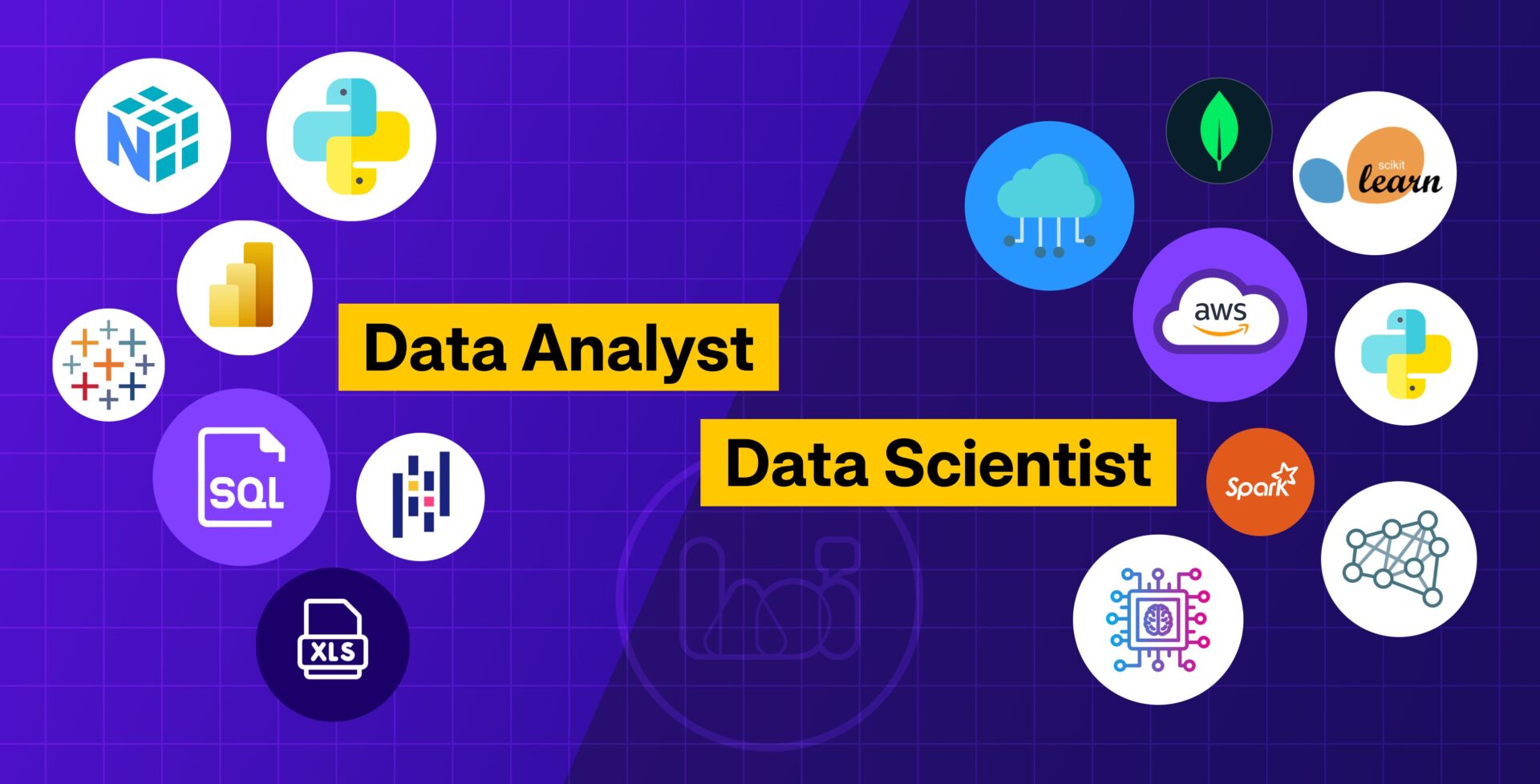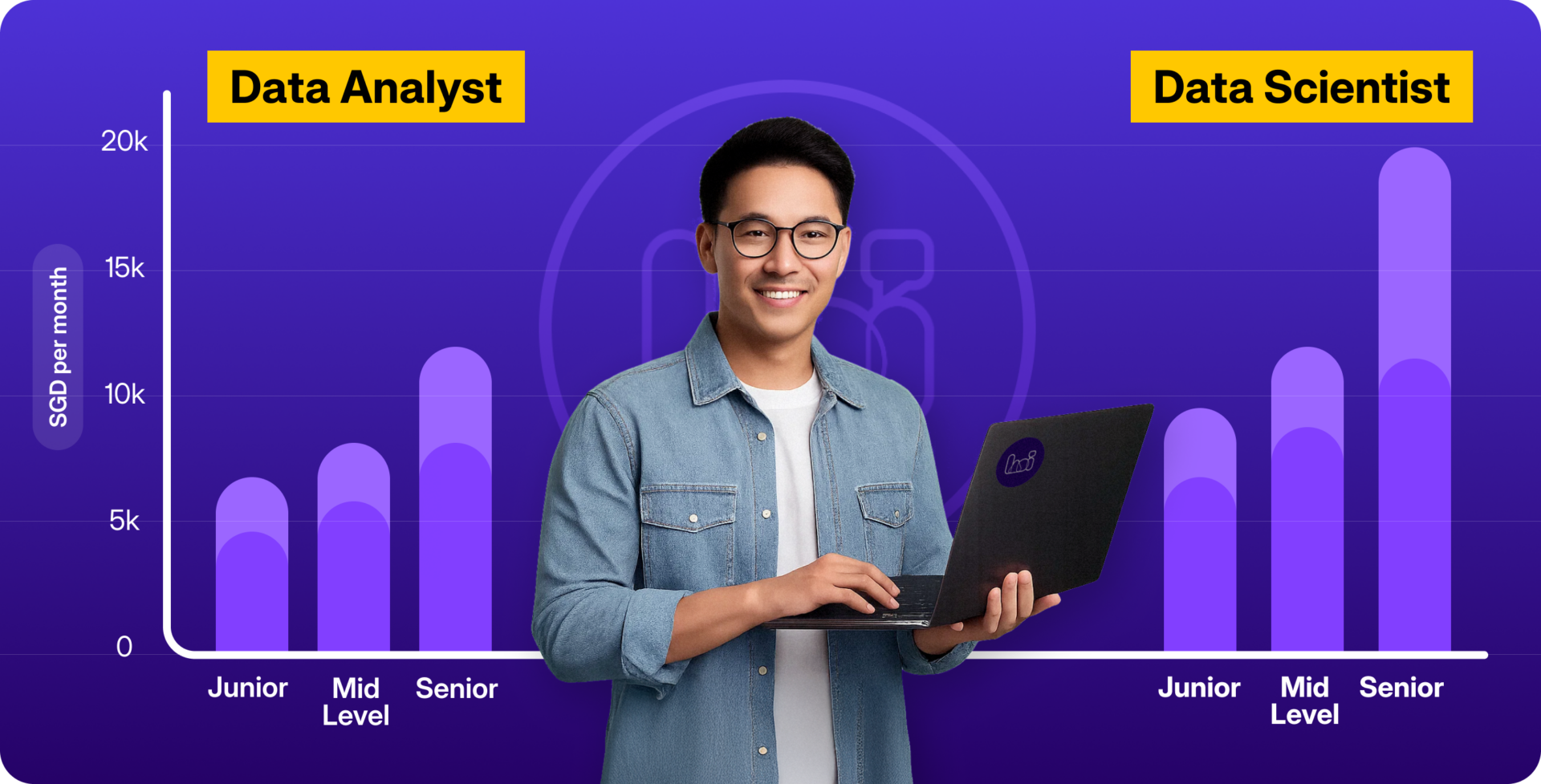Blog > Data Analytics/ Data Science & AI > What is The Difference Between Data Science & Data Analytics?
What is The Difference Between Data Science & Data Analytics?
Navigating the Data-Driven World of 2026
In a world where data is the new oil, the demand for professionals who can refine it into value has never been higher. Two of the most prominent roles in this data revolution are the Data Analyst and the Data Scientist. While often used interchangeably, they represent distinct career paths with different skills, responsibilities, and futures.
This guide provides a definitive 2026 comparison tailored for aspiring professionals in Singapore. We will explore their core differences, the impact of Generative AI, the local job market, and provide a clear framework to help you decide which path is right for you. Whether you’re a fresh graduate, a mid-career switcher, or simply data-curious, this article will equip you with the knowledge to make an informed decision.
Quick Facts: Data Careers in Singapore
| Metric | Data Point | Source |
|---|---|---|
| Job Growth (Data Science) | 36% projected (2023-2033) | US BLS [4] |
| Average Analyst Salary (SG) | S$7,500 / month (Mid-Level) | Morgan McKinley [2] |
| Average Scientist Salary (SG) | S$10,500 / month (Mid-Level) | Morgan McKinley [2] |
| Top Hiring Industries (SG) | Finance, E-commerce, Tech, Healthcare | IMDA [1] |
| In-Demand Skills | SQL, Python, Tableau, Machine Learning |
The Short Answer: Data Analytics vs. Data Science

Data Analytics explains the past and present. It answers “What happened?” and “Why?” by analysing structured data (like sales figures) to create reports and dashboards. A Data Analyst is a detective who finds insights in existing data.
Data Science predicts the future. It answers “What will happen?” and “How can we influence it?” by building predictive models from all types of data (including text and images). A Data Scientist is an architect who builds systems to forecast and shape future outcomes.
What is Data Analytics? Interpreting the Present
Data Analytics is the process of inspecting, cleaning, transforming, and modeling data with the goal of discovering useful information, informing conclusions, and supporting decision-making. A Data Analyst acts as a bridge between raw data and business strategy, translating numbers into actionable insights.
They primarily work with structured data—neatly organized information found in databases and spreadsheets. Their focus is on descriptive and diagnostic analytics, which means they look at historical data to understand what happened and why.
A Day in the Life of a Data Analyst
A Data Analyst at a Singaporean e-commerce company like Shopee or Lazada might spend their day:
- Creating Dashboards: Building a Tableau dashboard to track daily sales performance across different product categories.
- Running Queries: Using SQL to pull data on customer purchasing behaviour to understand the impact of a recent marketing campaign.
- Generating Reports: Compiling a weekly report for the marketing team on website traffic and conversion rates.
- Presenting Findings: Explaining to stakeholders why a particular product’s sales have declined, using data visualisations to support their story.
In Summary: A Data Analyst looks backward to explain the present, using data to tell a story about business performance.
What is Data Science? Building the Future
Data Science is a multidisciplinary field that uses scientific methods, processes, algorithms, and systems to extract knowledge and insights from structured and unstructured data. It’s a broader, more forward-looking discipline that encompasses data analytics and goes a step further by using advanced techniques to make predictions.
A Data Scientist not only analyses data but also builds models and algorithms to forecast future events. They are comfortable with ambiguity and often work with messy, unstructured data like text from customer reviews, images, or server logs.
A Day in the Life of a Data Scientist
A Data Scientist at a company like Grab or DBS Bank in Singapore might be tasked with:
- Building a Predictive Model: Developing a machine learning model to predict customer churn based on their app usage patterns.
- Developing an Algorithm: Creating a recommendation engine that suggests personalised products to users.
- Working with Big Data: Using tools like Apache Spark to process massive datasets that are too large for traditional databases.
- Experimentation: Designing and running A/B tests to determine the most effective pricing strategy or app feature.
In Summary: A Data Scientist looks forward to predict the future, using data to build intelligent systems.
Key Differences Explained
| Difference | Data Analyst | Data Scientist |
|---|---|---|
| 1. Focus | Past & Present: Analyses historical data to explain business performance. | Future: Uses past data to predict future trends and build models. |
| 2. Scope | Specific Questions: Answers defined business questions (e.g., “Why did sales drop?”). | Open-ended Problems: Explores data to find new questions and opportunities. |
| 3. Programming | Proficient: Strong SQL is a must. Basic to intermediate Python for analysis. | Expert: Advanced Python for building models and algorithms. |
| 4. Statistics | Applied: Uses statistical methods to interpret data. | Theoretical: Deep understanding of statistics to create and validate models. |
| 5. Machine Learning | User: May use pre-built models. | Creator: Builds, trains, and deploys custom machine learning models. |
| 6. Business Impact | Informs Strategy: Provides insights that guide business decisions. | Drives Strategy: Creates data products that can become core to the business. |
Skills Showdown: What to Learn in 2026
The skills required for each role are distinct, though there is some overlap. Here’s a breakdown for the 2026 job market.

Data Analyst Skill Set
- Essential Tools: SQL, Microsoft Excel
- Data Visualisation: Tableau, Power BI
- Programming: Python (with Pandas, NumPy)
- Statistics: Foundational descriptive and inferential statistics
- Soft Skills: Business acumen, communication, data storytelling
Data Scientist Skill Set
- Programming: Advanced Python (with Scikit-learn, TensorFlow, PyTorch)
- Databases: SQL and NoSQL (e.g., MongoDB)
- Big Data Technologies: Apache Spark, Hadoop
- Machine Learning: Supervised and unsupervised learning, deep learning
- Cloud Platforms: AWS, Google Cloud, or Microsoft Azure
- Soft Skills: Research, experimentation, strategic thinking
Detailed Comparison: Data Scientist vs. Data Analyst
| Feature | Data Analyst | Data Scientist |
|---|---|---|
| Primary Goal | Solve business problems with existing data | Predict future outcomes and build data products |
| Key Questions | “What happened?” “Why did it happen?” | “What will happen?” “How can we influence it?” |
| Data Type | Structured (e.g., spreadsheets, databases) | Structured & Unstructured (e.g., text, images, logs) |
| Core Skills | SQL, Excel, Tableau, Power BI, Statistics | Python, Machine Learning, Deep Learning, Big Data |
| Technical Depth | Intermediate | Advanced |
| Typical Output | Dashboards, Reports, Visualisations | Predictive Models, Algorithms, Data Products |
| Education | Bachelor’s Degree or Professional Certificate | Bachelor’s + Master’s/PhD often preferred |
| 2025 Singapore Salary | S$4,500 – S$9,500 / month | S$6,800 – S$16,500 / month |
| Analogy | Detective / Historian | Futurist / Architect |
| Key Certifications | Google Data Analytics, Microsoft Power BI | AWS Certified ML, TensorFlow Developer |
| Example Project | Build a sales dashboard in Tableau | Create a customer churn prediction model |
The Impact of AI and Generative AI
Generative AI tools like ChatGPT and Google’s Gemini are not replacing these roles but are transforming them. Professionals who can leverage AI will have a significant advantage.
- For Data Analysts: AI can automate report generation, write complex SQL queries from natural language prompts, and suggest insights from dashboards. The analyst’s role is shifting towards validating these AI-generated insights and focusing on the strategic implications.
- For Data Scientists: AI can accelerate the coding process, help debug models, and even assist in developing new algorithms. This frees up scientists to focus on more complex problem-framing and experimental design.
Career Paths and Job Demand in Singapore
The Singapore government’s focus on becoming a Smart Nation has fueled immense demand for data professionals. According to a 2025 report by the Infocomm Media Development Authority (IMDA), data-related roles are among the most in-demand tech jobs in the country [1].
Data Analyst Career Path
- Entry-Level: Data Analyst, Business Intelligence Analyst
- Mid-Level: Senior Data Analyst, Analytics Manager
- Senior-Level: Head of Analytics, Director of Business Intelligence
Data Scientist Career Path
- Entry-Level: Junior Data Scientist, Machine Learning Engineer
- Mid-Level: Data Scientist, Senior Data Scientist
- Senior-Level: Lead Data Scientist, Head of Data Science, Chief AI Officer
Salary Showdown: Singapore 2025
Salaries in Singapore for data roles are competitive and reflect the different skill levels. Data from Morgan McKinley and Nodeflair provide a clear picture for 2025 [2] [3].

| Role | Junior (1-3 years) | Mid-Level (3-5 years) | Senior (5+ years) |
|---|---|---|---|
| Data Analyst | S$4,500 – S$6,500 | S$6,000 – S$8,500 | S$8,000 – S$12,000+ |
| Data Scientist | S$6,500 – S$9,000 | S$8,500 – S$12,500 | S$12,000 – S$20,000+ |
While data scientists generally earn more, a highly skilled senior data analyst in a high-demand industry can earn as much as a mid-level data scientist.
How to Choose Your Path: A Decision Framework
Ask yourself these five questions:
1. What kind of problems excite you?
- Solving puzzles with clear clues? (→ Data Analytics)
- Exploring the unknown and building new things? (→ Data Science)
2. How comfortable are you with programming and math?
- Enjoy using tools and are proficient in logic? (→ Data Analytics)
- Love deep programming, algorithms, and advanced statistics? (→ Data Science)
3. What is your ideal work output?
- Creating clear, impactful reports and dashboards? (→ Data Analytics)
- Building complex models and data-driven products? (→ Data Science)
4. What is your long-term career goal?
- To become a business leader who uses data to make decisions? (→ Data Analytics)
- To become a technical expert who pushes the boundaries of AI? (→ Data Science)
5. How much time can you invest in learning?
- Looking for a faster transition into a data career (3-6 months)? (→ Data Analytics)
- Willing to invest more time in advanced education (1-3 years)? (→ Data Science)
How to Get Started with Heicoders Academy
Heicoders Academy offers structured pathways for both careers, with SkillsFuture subsidies of up to 70% available for Singaporeans.
- For Aspiring Data Analysts: The Data Analytics Nanodegree is the perfect starting point. It covers SQL, Tableau, and Python, giving you the job-ready skills to land your first role.
- For Aspiring Data Scientists: The AI Nanodegree provides a comprehensive foundation in Python, applied machine learning, and model deployment, preparing you for the technical challenges of a data science career.
Frequently Asked Questions (FAQ)
Do data analysts get paid well in Singapore?
Yes, data analysts in Singapore are well-compensated. According to 2025 salary data, an entry-level (Junior) Data Analyst earns between S$4,500 – S$6,500 per month. This can increase to over S$12,000 per month for a senior role with more than 5 years of experience [2] [3].
Is a “Data Analyst I” role considered entry-level?
Yes, positions titled “Data Analyst I” or “Junior Data Analyst” are standard entry-level roles. They are designed for career starters or switchers who have foundational skills, often from a degree or a professional certificate program.
Is data analytics full of coding?
Not entirely, but some coding is essential. A data analyst must be proficient in SQL to query databases. While much of the work can be done in tools like Tableau and Excel, a foundational knowledge of a programming language like Python or R is becoming a standard requirement for data manipulation and analysis. It is significantly less code-intensive than a data science role.
Will AI replace data analysts?
No, AI is augmenting data analysts, not replacing them. AI automates routine tasks like data cleaning and report generation, which frees up analysts to focus on higher-value work such as interpreting complex results, data storytelling, and providing strategic business recommendations. Analysts who can leverage AI tools will be in even higher demand.
Which is easier to learn, data analytics or data science?
Data analytics is generally considered easier to enter. The core skills (SQL, Excel, Tableau) have a less steep learning curve than the advanced programming and machine learning required for data science.
Can a data analyst become a data scientist?
Yes, this is a very common and recommended career path. Starting as a data analyst builds a strong foundation in data, business acumen, and core tools. From there, you can upskill in programming, machine learning, and advanced statistics to transition into a data science role.
Is data analytics a good career in Singapore?
Absolutely. With Singapore’s push towards a digital economy, the demand for data analysts remains incredibly high across all industries, from finance and e-commerce to healthcare and government.
Do I need a degree to become a data analyst?
While many companies prefer a degree, it is not always a strict requirement. A strong portfolio of projects and a professional certificate, like those offered by Heicoders Academy, can be sufficient to land an entry-level role, especially for mid-career switchers.
Which role is more future-proof?
Both roles are evolving, not disappearing. The key to being future-proof is continuous learning. Data scientists who master new AI models and data analysts who become experts in AI-assisted strategic analysis will remain in high demand.
What are the top 3 tools for a Data Analyst?
For a Data Analyst in 2026, the top 3 essential tools are SQL (for data extraction), Tableau or Power BI (for data visualisation), and Python (for data manipulation and analysis).
What are the top 3 tools for a Data Scientist?
For a Data Scientist in 2026, the top 3 essentials are Python (with libraries like Scikit-learn and TensorFlow), SQL (for data access), and a cloud platform like AWS, GCP, or Azure (for model deployment).
Which Singapore industries hire the most Data Scientists?
In Singapore, the top industries hiring Data Scientists are Technology (e.g., Grab, Sea Group), Finance (e.g., DBS, OCBC), and Healthcare. The government sector, through agencies like GovTech, is also a major employer.
Your Data Journey Starts Now
Choosing between data analytics and data science is a choice between interpreting the world as it is and building the tools that will shape its future. Data analytics offers a faster, more direct path to making a business impact, while data science provides the tools to tackle more complex, predictive challenges.
Both paths are rewarding, in-demand, and critical to Singapore’s future. By understanding your personal interests, career goals, and learning capacity, you can confidently choose the right path and begin your journey in the exciting world of data.

Upskill Today With Heicoders Academy
Secure your spot in our next cohort! Limited seats available.
